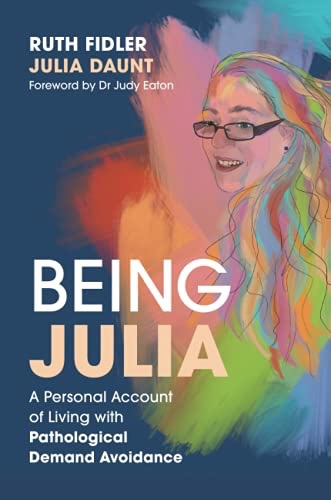
I have just finished reading Being Julia and I feel very honoured to be able to review such an insightful resource; a book that I will be returning to time and time again.
I first discovered Julia Daunt and her blog Me, Myself and PDA back in 2016 and I’ve been learning from her words ever since. I drafted Julia an email when my daughter was in reception class and our world had turned upside down. The reason I had such an interest in Julia was because her voice, her words and experiences felt like they could have been my daughter’s. In those early days, they helped me to unlock a better understanding of my daughter’s challenges. Listening to autistic experience is by far the first place to begin learning.
The book is co-authored by Ruth Fidler, who I have had the pleasure to appear as a speaker alongside and whose professional expertise in the field of autism and PDA is extensive. I also discovered Ruth’s work back in 2016 and it was to be the first conference I enrolled myself on to educate myself better. I wholeheartedly value Ruth’s contribution in improving the wellbeing of families across the community.
There is a strong bond and a mutual, working relationship between the two co-authors that flows rhythmically through the rhetoric of the book. It makes the reader feel safe in their united words and they make a wonderful writing team.
The book is told from the perspective of Julia and what it means to be her. This comes also from the perspective that she has a diagnosis of Pathological Demand Avoidance (PDA), ADHD and is susceptible to experiencing psychotic episodes.
It is at times very raw, incredibly brave and difficult to read – that is said from a parent who could identify with every page they turned.
There are parts that are tainted in sadness (particularly memories of the past and the social vulnerability that could easily be exploited in Julia) but these are cleverly mixed with her unique creativity and humour that fills the pages too.
The book is crafted into sections that cover a wide range of topics and enlighten the reader with understanding from her own autistic experience. They cover topics like relationships, communication and language, sensory difficulties and growing up. The book also breaks down what avoidance looks like for Julia with many real life examples that we can identify with.
Interwoven throughout the chapters are anecdotal stories, reports and accounts that also paint a bigger picture of Julia’s life and at times her moments of being misunderstood. Her poem ‘If’ which was written as a young person really visualises the inner mind and her creative intelligence beyond her years.
One of the chapters that was the most emotional was from the perspective of Julia’s long-term partner, Paul. His words, his ability to reflect and support, to make adaptations in order to make the relationship work and his dedicated love for his partner – elements that gave me the inspiration of what can be achieved with the right support. He also makes it clear he is very lucky to be in a relationship with Julia and as a parent of a PDA’er, I would echo this very point. At times the challenges may be tricky to navigate, but the reciprocated love and loyalty are tenfold. We are the entitled ones to be close to our fantastic loved ones. I also feel pleased that despite her earlier difficulties in navigating relationships, it shaped her into finding a great partner.
I was also moved by the strong relationship between Julia and her mother – with particular poignancy in Julia’s handwritten sorry letter from when she was a teenager. My daughter does similar for me, but I could also empathise with how strong her mother advocated for her, at a time when there was not a community behind her.
There were so many points in the book that made me smile and were hugely relatable! I loved the descriptions of Julia’s trusted aide ‘Alf’ and in our house that has always been ‘Rabbit,’ who is more than just a plush toy – they help with day to day activities. I also loved Julia’s invented words that the couple both use and a dictionary list appear in one chapter. This is like my youngest child (who I also suspect is PDA), who has an entire language of invented words like ‘eggy,’ ‘borg’ and ‘goodge.’ As a family we understand their context but it confuses anyone who enters the home.
The book is such an insightful resource and one that I will be sharing with family and professionals moving forwards.
To purchase a copy of Being Julia, here is a link to the website and further pricing details from Jessica Kingsley Publishers.
*Disclaimer* No payment was received for this book review, just a copy of the book kindly donated from the publisher. All views my own.


Leave a Reply